
A french perspective of the rest of the world, (honestly, just America)!


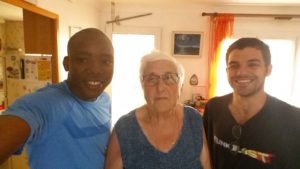
Luckily, I think my host mom sensed that I needed to be saved from sinking in the boat of nostalgia and she kicked n with her sweet gestures to remind me of why I need to keep my head up and enjoy France. She told about the other students she had hosted for the longest time had gone through similar phases. She continues to wave for me when I left the morning for school, she would routinely ask me about my day at school. She told me about her vacations to Japan and how she yearns to travel more but her age makes it hard for her to go through a lengthy plane right. I feel much better now because I found a pharmacy that had the right medicine, eventually. I explained to the pharmacist in French about my condition and was impressed my with my fluency, although it was clear I was not a French native.
After spending approximately 2 months in China, my global perspective transformed dramatically. Being able to navigate different cultural landscapes and understand a drastically different culture is my biggest takeaway from this program.
My biggest difficulty in China was understanding the notorious “er er” intonation from Beijing locals. Most people who don’t take Chinese don’t know that there are many different accents and dialects, not unlike English. For example, “where” in Mandarin can be pronounced ” na li” or “na er.” Based on the intonation and context, you are supposed to understand the other person. In Beijing, people use the “er” sound for many words. In a classroom setting, unless your teacher is from the Beijing area, they won’t use this pronunciation, so it can be very hard for foreigners to get used to it. After 2 months in China, I have finally overcome this difficulty, and can casually speak to Beijing locals. I have definitely met my goals during this program.
As a result of this experience, I have gained insight as to how Chinese people spend their daily lives, what they eat, but most importantly, how they think. In the future, I want to work closely with Chinese companies, so I need to know important cultural nuances. For example, gifting a Chinese person a clock is a huge cultural taboo. Knowing little things like that will definitely give me an advantage in a competitive business atmosphere. My advice for someone who was considering applying for an SLA Grant or preparing to start their own summer language study is to try as hard as possible to learn things that could help for your future job, not just fun trivia knowledge; it could prove invaluable in the future.
I guess the ultimate question is, where do I go from here? Well, I believe that as long as I keep studying Mandarin, using WeChat to communicate with my new Chinese friends, and continue practicing with my classmates, I will maintain my oral fluency. In the future, I plan on going to law school, and then eventually, pursuing a career in corporate law. Where does Chinese fit in this, you might ask? I would like to help build bridges between American companies and Chinese companies through law and business. This is why I am double majoring in Finance and Chinese right now. My experience this summer allowed me to learn cultural nuances that will undoubtedly help me in my future endeavors.
I can’t believe it – it is already the last week of my stay in Alicante! In so many ways, I feel as if I just arrived. When I told my host family that my flight leaves Saturday morning, in just six days, they were visibly shocked—my mamá thought I had another week! With this realization, we have come up with a list of things we have not gotten around to doing: on Wednesday, I am teaching them how to make chocolate chip cookies; on Thursday, we are playing our last tennis match; on Friday, we are going to their favorite restaurant. My host mother also lamented that she hasn’t made me her special brownies, or taken me to hike up a nearby mountain they love, so we decided that I have to return and then we can complete these tasks too.
The end is approaching quickly, and I have so many mixed feelings about my departure. In many ways, I miss my life in the United States; I, of course, miss my family and friends, and could not be more thrilled to see them, but I miss some little things too, things I hadn’t appreciated at home before living in Spain, like free water, air conditioning, and big cups of coffee! On the other hand, there are so many people and places here that have made my experience so great, and that I cannot imagine saying ¡adios! to already. Obviously, at the top of this list is my host family. They have been so generous, kind, and simply fun. I will miss my mamá’s sweet smile every time she checked on me, my papá’s endless dad jokes, the little sister I never had asking me for advice, and playing tennis with my brother. I hope this will not be goodbye forever, because I have truly grown to appreciate and love this wonderful family as my own.
I will miss the city itself, too—its sandy beaches, its history, its energy. Not a day has gone by that I haven’t admired my surroundings on my morning walk to the tram with a deep sense of awe and gratitude.
Finally, I will miss the language. Though I knew I had a passion for Spanish before arriving, I was embarrassed by my lack of skills; I was struggling to keep up, and hesitant to talk. Now, after so much practice and rapid advancement throughout the past several weeks, I absolutely love listening and speaking this beautiful, challenging, exciting language. I am no longer scared to contribute or make a mistake. On the contrary, I will gladly make mistakes if it means I will be corrected and improve further. While, of course, I will continue taking demanding Spanish classes at Notre Dame, that setting can never compare to being completely immersed in the language. I am already exploring my options for more Spanish language development next summer. 🙂
 I am almost hitting the halfway mark of my study abroad season. At home, I look forward to coming back to my host mom, hearty and mouth-watering three-course meal. At school, I have exhausted the “new guy” jacket, now I am growing a comfort of certainty of how my days are going. Little did I know that things were about to change, to get a fresh injection of foreignness when I visited two of the Chateaux closest to my city, “Château de Villandry et Château de Langeais”. The picturesque scenery stimulated my sense of appreciation in a way I’m sure will only come one or two more times in my lifetime. I was impressed by the well cultivated green fields in rectangular and square-like maze structures. When I shared with a few of my family back home, their responses totally agree with mine; the pictures look like pictures from the movies we watch on tv back home, knowing very well that they are from a far away land that we are more likely never to see with our own two eyes. I had a to squeeze in a “selfie” with a castle in the background because I anticipated without hard evidence that I took the photo, so many people were not going to buy the idea that I indeed visit these places, that I did not download them off the internet.
I am almost hitting the halfway mark of my study abroad season. At home, I look forward to coming back to my host mom, hearty and mouth-watering three-course meal. At school, I have exhausted the “new guy” jacket, now I am growing a comfort of certainty of how my days are going. Little did I know that things were about to change, to get a fresh injection of foreignness when I visited two of the Chateaux closest to my city, “Château de Villandry et Château de Langeais”. The picturesque scenery stimulated my sense of appreciation in a way I’m sure will only come one or two more times in my lifetime. I was impressed by the well cultivated green fields in rectangular and square-like maze structures. When I shared with a few of my family back home, their responses totally agree with mine; the pictures look like pictures from the movies we watch on tv back home, knowing very well that they are from a far away land that we are more likely never to see with our own two eyes. I had a to squeeze in a “selfie” with a castle in the background because I anticipated without hard evidence that I took the photo, so many people were not going to buy the idea that I indeed visit these places, that I did not download them off the internet. I loved to learn that these used to be residences of rich families in the past, and that tradition is in a way being preserved with these castles being bought by high-profile people. Previously, I was under the impression that something from the medieval era would lose value as time went on. It turns out, at least for architecture, the opposite is quite true. The worth of these chateaux will exponentially increase as we move into the future. I was impressed by the unique vineyards, green tennis courts and yards, the gray and red brick of the walls, the colorful flowers in the gardens. The sunny weather of the day appeared to want us to have the best view possible of these great castles.
I loved to learn that these used to be residences of rich families in the past, and that tradition is in a way being preserved with these castles being bought by high-profile people. Previously, I was under the impression that something from the medieval era would lose value as time went on. It turns out, at least for architecture, the opposite is quite true. The worth of these chateaux will exponentially increase as we move into the future. I was impressed by the unique vineyards, green tennis courts and yards, the gray and red brick of the walls, the colorful flowers in the gardens. The sunny weather of the day appeared to want us to have the best view possible of these great castles.
 At my school, Institut de Touraine, I am one of the few students who reside far away from campus, so much so that I have to get a month’s Student Pass with FilBleu for commuting every day on the city’s tram network. The curvy-edged, metallic-silver machine that slid smoothly across the city’s green lawns is one of the reasons I am having no problems with staying far from school! I am impressed with the technology that has been invested in this vehicle; the automated door system, the precise time of arrival of each scheduled train and the barricaded yet transparent driver area with cockpit-like equipment. If anything, this is a sign of how advanced the French public system is. As an ambitious young pan-African scholar, experiencing such exemplary standards for the greater good of the public is truly an eye-opener and an inspiring testimony I hope to contribute in bringing to my own continent. I could not resist the edge to pull out my phone and record a ride’s length of video footage for my own archives. For those who will wonder why I was impressed with the train system in my host city beyond expected levels, my response is that the train is a microcosm reflection of the sustained, broad-based development that European powerhouses like France have enjoyed for long, the Middle-east and Asian Tigers have started to start and the African and South Americans can only dream for at present. I am reminded of my duty to learn of this trip as much as my brain can take to begin gathering the pieces for the surmountable task I have ahead to contribute to the betterment of Africa. However, my image of France has not been all glittering gold….
At my school, Institut de Touraine, I am one of the few students who reside far away from campus, so much so that I have to get a month’s Student Pass with FilBleu for commuting every day on the city’s tram network. The curvy-edged, metallic-silver machine that slid smoothly across the city’s green lawns is one of the reasons I am having no problems with staying far from school! I am impressed with the technology that has been invested in this vehicle; the automated door system, the precise time of arrival of each scheduled train and the barricaded yet transparent driver area with cockpit-like equipment. If anything, this is a sign of how advanced the French public system is. As an ambitious young pan-African scholar, experiencing such exemplary standards for the greater good of the public is truly an eye-opener and an inspiring testimony I hope to contribute in bringing to my own continent. I could not resist the edge to pull out my phone and record a ride’s length of video footage for my own archives. For those who will wonder why I was impressed with the train system in my host city beyond expected levels, my response is that the train is a microcosm reflection of the sustained, broad-based development that European powerhouses like France have enjoyed for long, the Middle-east and Asian Tigers have started to start and the African and South Americans can only dream for at present. I am reminded of my duty to learn of this trip as much as my brain can take to begin gathering the pieces for the surmountable task I have ahead to contribute to the betterment of Africa. However, my image of France has not been all glittering gold….
 As a first-time visitor in a beautiful country rich with life that is more foreign than similar to my own, I was more observant than usually as soon as my feet touched the French soil. One of the first impressions I registered was the racial (and when possible, national) representation in the spaces I was entering. It was interesting to pick that I had seen most people of African origin at the train stations in Paris and Tours, my ultimate destination. There were more descendants of Ivory Coast, Cameroon and Niger in Paris at Gare de Montparnasse, and the numbers began to dwindle as I moved away into my host community. Additionally, I noticed that there were a significant number of people of Arabic origin, and when I had the chance to spark a conversation with some of them, I learned that they came from countries like Lebanon, Tunisia, Morocco, and Algeria. As minor of a detail this may be to someone else, it was essential to me because I was witnessing firsthand the continuing effects of the colonial residue of the French’s occupation of most of West and North Africa. There is something irreplaceable about the mesh of race and class I am experiencing on this trip, and as one of my goals is to understand better the French culture and the world it extends to beyond the country’ s borders, I feel I am on the right track!
As a first-time visitor in a beautiful country rich with life that is more foreign than similar to my own, I was more observant than usually as soon as my feet touched the French soil. One of the first impressions I registered was the racial (and when possible, national) representation in the spaces I was entering. It was interesting to pick that I had seen most people of African origin at the train stations in Paris and Tours, my ultimate destination. There were more descendants of Ivory Coast, Cameroon and Niger in Paris at Gare de Montparnasse, and the numbers began to dwindle as I moved away into my host community. Additionally, I noticed that there were a significant number of people of Arabic origin, and when I had the chance to spark a conversation with some of them, I learned that they came from countries like Lebanon, Tunisia, Morocco, and Algeria. As minor of a detail this may be to someone else, it was essential to me because I was witnessing firsthand the continuing effects of the colonial residue of the French’s occupation of most of West and North Africa. There is something irreplaceable about the mesh of race and class I am experiencing on this trip, and as one of my goals is to understand better the French culture and the world it extends to beyond the country’ s borders, I feel I am on the right track!

The last week! I’ve had a wonderful time here in Italy. I can definitely say that I learned a plethora of grammatical rules and tenses in Rome with ItaliaIdea. I am so very grateful to the donors who were generous enough to give me this opportunity, and I will undoubtedly be back in Italy, if not Rome.
This past week, there was the national holiday Ferragosto on Tuesday. Ferragosto was originally a pagan holiday, but because Catholicism is the national religion of Italy, it has been transformed to celebrate the Assumption of Mary. That day, the whole of Rome seemed void of Italians. This is because most Italians leave the city to flock to the beaches and have lunch or dinner and party with their friends and family. Since I didn’t have class, however, Huda and I had an American breakfast at a bar called Meccanismo in Trastevere and then right after, we went to the Borghese Gardens. We got refreshments and sat in the park and talked, watching Italians and tourists alike pass the holiday out in nature.
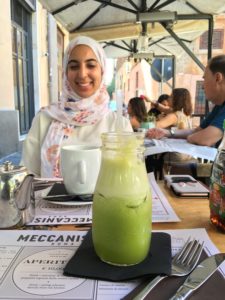


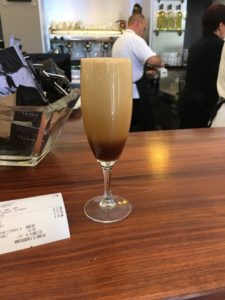

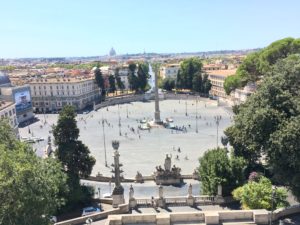
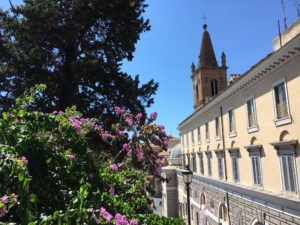
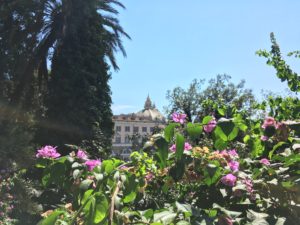
Later that evening, we met one of Huda’s friends, Jurgita, at the Spanish steps. Coming from Lithuania, she had just finished an internship in Florence and was living in Rome. She had just returned to Rome from a vacation at home and it was her birthday, so we celebrated by getting gelato and then sitting on the spanish steps to talk.
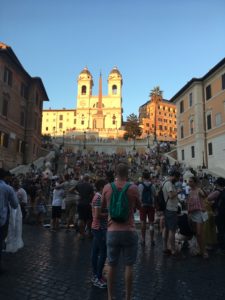
Friday, my last day, I ended up having lunch with Huda before class and we went to this Sicilian bakery we knew near Via Arenula. Later that night, we had our last dinner tonight at a well-known restaurant, Nonna Betta, in the Jewish Quarter.


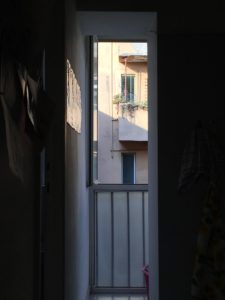
The most surprising thing about Italy was the pervasiveness of the English language. In most restaurants, shops, and the streets of even small cities, the locals speak to tourists in English – some with excitement at the opportunity to practice, and others with grudging distain.
I discovered that as a result, perhaps, Italians are generally excited, impressed, and grateful when an American replies to them in Italian – no matter how poor the pronunciation or syntax.
Perhaps the pervasiveness of English is an aggregate good for commerce, the sharing of ideas, and the creation of a global culture – in which people across the world consume and appreciate the same literature, film, and other media – but sometimes it makes me feel like a downright imposition. The Italians and other Europeans I interacted and conversed with on a daily basis were forced to meet me more than half way when comprehension was lacking on either side.
Most obvious were the embarrassing encounters at stores where the busy clerk, upon seeing that I hadn’t comprehend his blur of Italian slang, laboriously and disdainfully spat: “vould you like a baaag?”
More poignant an example is what transpired when my Italian friend introduced me to his French friend from Erasmus, the European equivalent of study abroad. Eddy (Edoardo) speaks his regional dialect, Italian, passable French, and very good English. Yana speaks her native French, less Italian than I (and that is a meaningful distinction), and English. As a result, most of our conversations – excepting the moments in which Eddy tried to impress and flatter Yana with declarations in French – were in English.
As the native speaker in this scenario, I found myself explaining the idioms, pointing them in the right direction as they searched for the English words to express themselves, and occasionally giving a small grammar lesson. I felt their micro-frustrations when they struggled to get a point across in my vulgar tongue.
I learned that Americans are exceptionally privileged – even compared to the more international British – because their language is spoken globally, yet also sheltered and disconnected. I hope that next time I go to Italy the natives I converse with will only have to meet me a little more than half way linguistically.